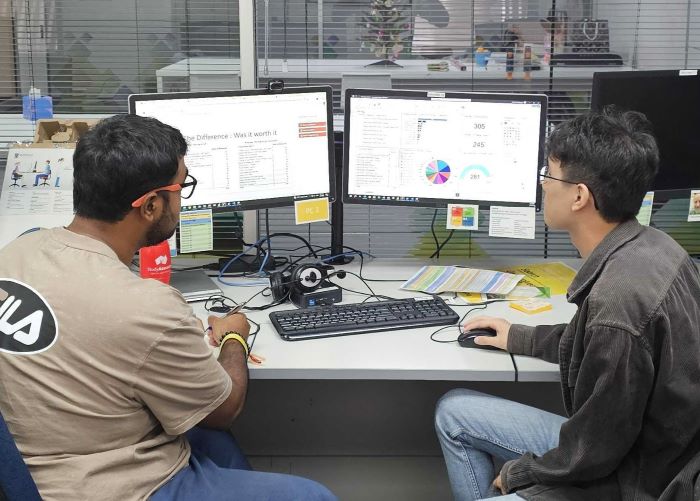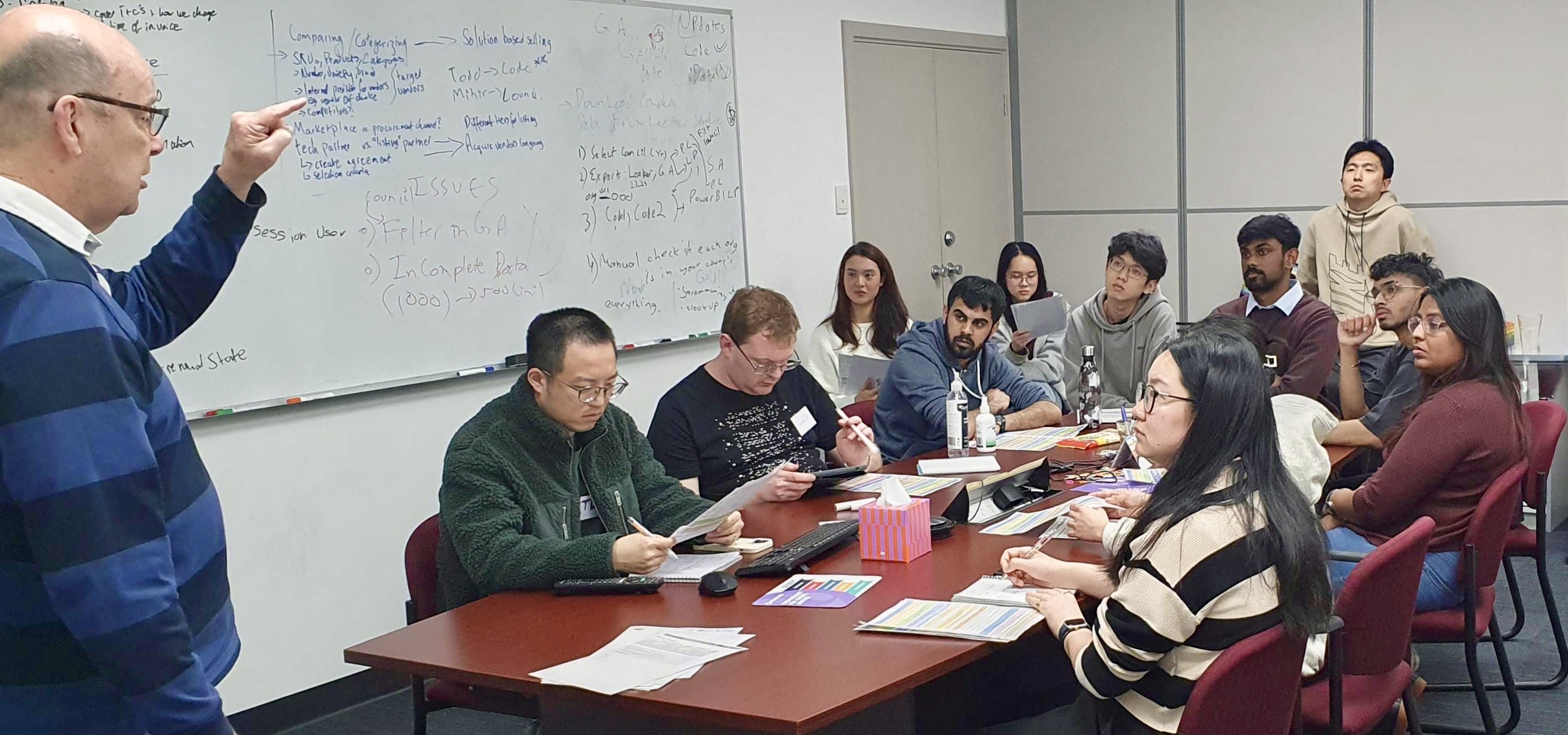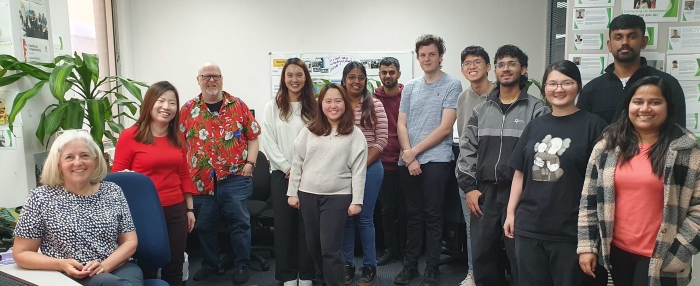My Volunteer Experience - Jason Chun Kwan Lam
Welcome Jason!
Jason Chun Kwan Lam joined our SAcommunity Data Analytics Team as a volunteer on 14th August 2024 after completing his Information Technology Degree and while seeking work in the field.
Jason was successful in a contract role to assist a government department for a month and following a brief return to volunteering is now working full-time at DXC Technology as a Service Desk Analyst from 30 June 2025. Congratulations Jason!
It has been wonderful to have you come in and share your news with us at the office to tell us all about your new role. Well done!
Total Hours 522 This Year 204 Joined 21 August 2024 Last Check-in 27 June 2025
Personal Biography
Jason completed his Bachelor of Information Technology at The University of Adelaide in 2022, majoring in Cyber Security. As an international student, he serves on the committee for the Hong Konger Australia Support (HKAS) as the IT Director in the cybersecurity sector, where he applies various cybersecurity protocols to the organisation’s website. Additionally, he assists and supports the group in hosting numerous events for the Hong Kong community.
Jason has extensive event planning experience with the University of Adelaide Hong Kong Macau Society and Hong Konger Australia Support. He is currently completing his studies at 42 Adelaide while volunteering with the SAcommunity Team and continuing his role as IT Director for HKAS.
He joined the SAcommunity Team as a volunteer at Connecting Up to gain more real-world experience in the Australian working environment. Jason hopes that being part of the Data Analytics Team will help him further investigate the practical applications of Information Technology in the field, explore his interest in digital marketing, build upon his academic skillset, and develop his interpersonal skills—all of which he believes will be beneficial for his future career.
In the future, following his key interests in cybersecurity, he aims to work as a Cybersecurity Consultant. He also plans to combine his interests in event planning and Information Technology as an IT Project Manager, assisting the team by planning, organising, and guiding projects.
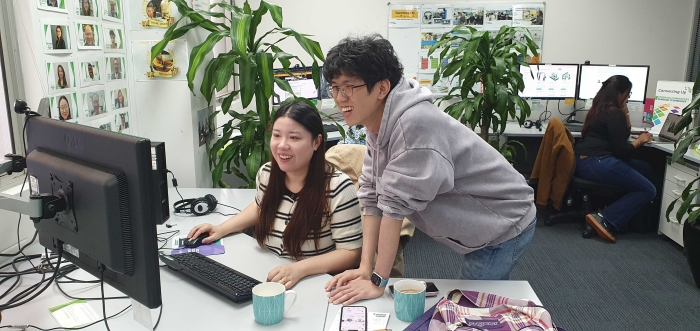
Photo: Lanxi Zhang and Jason discussing on council statistics project
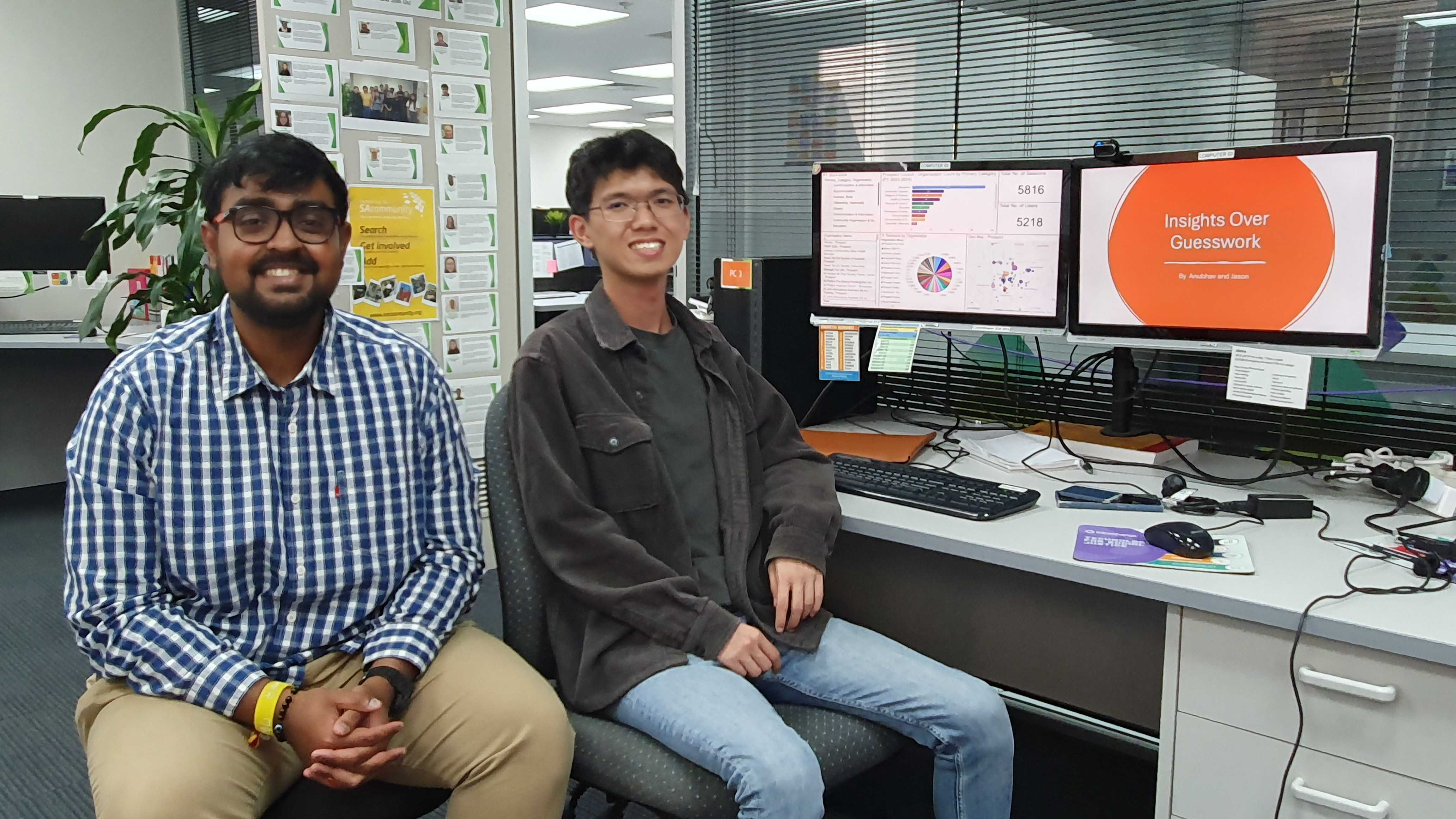 Image: Jason and Anubhav with their elevator pitch 18 Feburary 2025
Image: Jason and Anubhav with their elevator pitch 18 Feburary 2025
Elevator Pitch: Leveraging Data Analysis in SAcommunity
Jason and Anubhav recently had the chance to deliver their elevator pitch at Stone & Chalk, demonstrating how they utilize data analysis to support SAcommunity. Their presentation showcased innovative approaches to harnessing data for valuable insights and meaningful impacts on local communities. This is their presentation.
Image: Comprehensive Documentation
Documentation on council report generation
To support these projects, I have been developing comprehensive documentation designed to guide users through the code and workflow improved from Anubhav and I. The documentation includes detailed, step-by-step instructions, practical examples, best practices, and visual aids like diagrams to ensure clarity. It’s intended for users at all experience levels, from beginners to advanced developers. We believe clear, well-structured documentation is vital for collaboration and future development, and we are committed to ensuring it's both accessible and easy to follow. Volunteers can also provide feedback or contribute to improving the content over time. The documentation will be regularly updated to reflect ongoing changes, and can be accessed via the link provided here.
Community Services in Councils Statistics Project
Jason has selected Adelaide City Council and Orroroo Carrieton Council for his PowerBI coouncil reports, a database of approximately 800 community services operating in the area for the finanacial year of 2021-2024. His report followed previous visualisation report work. His completed reports can be found>>here.
There are a few steps to create a community service report. Here is the outline that Jason followed:
1. Data Collection:
- Obtained sessions, new users, and user data from Google Analytics 4 for the services operating within Adelaide City Council for the financial year of 2023-2024.
- Download the organisation list under Adelaide City Council on the SAcommunity website.
2. Data Cleaning:
- Manually cleaned the data from Google Analytics 4 using the steps provided by volunteer Harsh.
- Cross-checked each organisation to ensure its affiliation with Adelaide City Council.
- Updated the sessions, new users, and user’s columns using the code developed by Anubhav, Mihir, and Jason.
3. Visualization:
- Following data cleaning, Jason created a PowerBI report and Canva report to visualise the data.
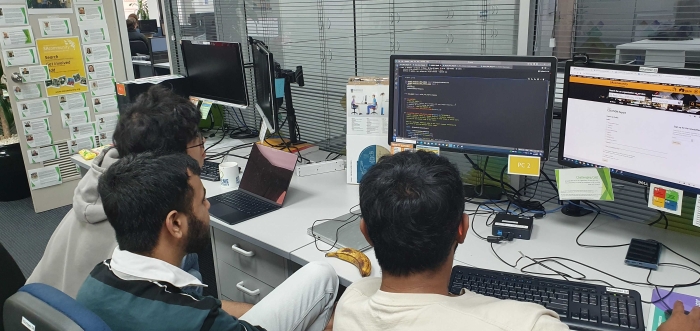
Working on Python: Jason Chun Kwan Lam, Mihir Desai, Anubhav Dattagupta
Below are the key projects and tasks Jason undertook in relation to this project:
Python Coding
Jason collaborated with fellow volunteers Anubhav and Mihir to identify the issues faced by the data analytics team due to inaccurate data for the financial year 2023-2024 in Google Analytics 4. To address this issue, they collected all organisational data for the financial year 2023-2024 from Looker Studio and developed a Python program to simplify the manual checking and updating of the “sessions,” “new users,” and “user” columns for each organisation, which are the first two steps in the data cleaning process. As a result, the code significantly reduced the time required for manual cleaning by automating it and shortened the data cleaning process from two weeks to within a week. This project not only improved the quality of the data but also assisted the data analytics team in streamlining the manual data cleaning process.
Google Analytics Issue Meeting
Jason, Anuhbav, Mihir, Catherine, James, and Statis Avramis convened a meeting to discuss the Google Analytics issues. They presented various short-term and long-term solutions to address these concerns. The presentation is here.
One key issue was the discrepancy between the Dataset Identification number and the Council. This misalignment poses a significant challenge, as it could lead to data discrepancies if not rectified. To address this, they proposed implementing an input consistency validator that would display a warning error when both fields are not aligned.
Another issue was the inclusion of /edit as a valid session in Google Analytics. This should not be counted as a valid session, as it involves volunteers or interns editing the organisation rather than representing organic user sessions. To address this, they proposed excluding /edit sending out from the SAcommunity website.
The final issue addressed was the frequent changes in councils and datasets, which caused the filters in Google Analytics 4 to function improperly, resulting in discrepancies in the filtered data. During discussions, they focused on identifying the root cause of this problem. Through case studies, they concluded that it was likely a systematic issue, as multiple updates occurred within a short timeframe without a clear sequence of actions.
To address this, they proposed several long-term and short-term solutions that could lead to significant improvements. Some were relatively easy to implement. The first suggested solution was implementing a ticket system that notifies the admin of any changes being made, requiring admin approval before these changes are reflected on the website. The second solution involved filtering organisations based on council at the end of the financial year using a Python script. For the long-term solution, they proposed utilizing the LGA API to automate the process of obtaining council data, thereby eliminating potential manual errors.
Photo: Data Analytics Team Improvement Meeting with SAcommunity Coordinator 7 Feburary 2025
Photo: Difference between two ways in the powerpoint
Data Analytics Team Improvement Meeting
Jason, Anuhbav, and Catherine gathered for an important meeting focused on enhancing the current data analytics workflow. They outlined various innovative solutions, employing advanced programs to tackle existing challenges effectively. The detailed presentation, which provides an in-depth explanation of these solutions, is available here.
A primary motivation for improving the workflow is the excessive time currently spent on manual data cleaning processes. To address this inefficiency, the team developed a specialised program designed to reduce this time from several days to mere minutes, significantly enhancing productivity and efficiency.
Additionally, the team demonstrated the differences between the old and new methods. The improved method not only increases the number of sessions processed but also incorporates organisations that previously had zero records, ensuring a more comprehensive and inclusive data analysis approach. This advancement highlights the team's commitment to continuous improvement and innovation in data analytics.
The meeting concluded with a discussion on the next steps for implementing the new workflow, setting timelines for integration, and assigning responsibilities to team members to ensure a smooth transition. The team remains optimistic about the positive impact these changes will bring to the organisation's data handling capabilities.
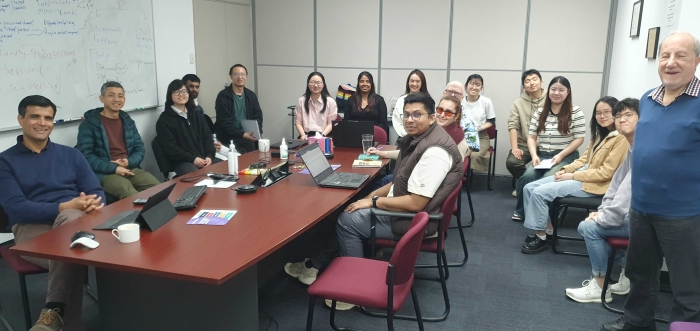
Photo: Connecting Up Staff Meeting 10 September 2024
Connecting Up Staff Meeting 13 August 2024 & 10 September 2024 & 8 October 2024
Jason attended Connecting Up staff meetings held on the 2nd Tuesday of the month with updates from the Connecting Up Team including monthly highlights, and future plans and activities across the teams.
Work experience - Internal and External Events, Connections and Networks
Volunteers and interns are encouraged to attend monthly SAcommunity Team meetings, Connecting Up staff meetings, as well as quarterly all-staff Infoxchange Town Hall meetings to understand more about the organisation as a whole.
This includes keeping up-to-date with organisation-wide news, events and projects are communicated through the staff channels, with weekly CEO Updates from David Spriggs. Informal 'Lunch and Learn' educational sessions, and network meetings create connections with staff. Whilst peer-to-peer training or capacity building and telephone techniques training allow for networking with other volunteers. Interns are also given opportunities to attend stakeholder and partner events as they arise.
Relevant meetings and training sessions Jason has attended include:
Telephone Training: Led by Volunteer David Webb
Training and Development - Telephone Techniques
Telephone techniques follow on with email and communication techniques, to assist Data Analytics Team members with understanding more about the directory and data collection methods, in data cleaning and updating their individual dataset information. This culminates in finally introducing and presenting their data reports to council stakeholders. There are several telephone techniques meetings, as with the student's elevator pitches practice is important in mastering this art.
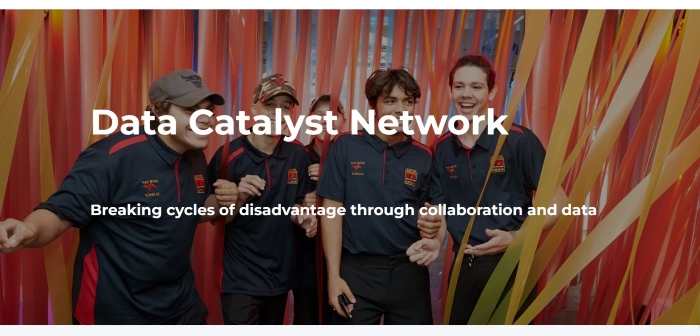
IX Stakeholder Events and Partnerships
Volunteers and interns are encouraged to attend stakeholder meetings including the Data Catalyst Network to understand how Infoxchange (IX) works across the not-for-profit sector.
Data Catalyst Network (DCN): Brings together people from across sectors, to break cycles of disadvantage through the innovative use of data.
Participants of the Data Catalyst Network will advance their data maturity while sharing and improving data insights through unique cross-sector partnerships to disrupt disadvantage. As a collective, the network will harness data and knowledge from the not-for-profit community sector, academia, government and business to better use and manage data to improve the lives of people across Australia.
Data and Research collaboration networks in the DCN: Mapping initial responses 5 September 2024
The Data Catalyst Network is actively involved in the ARDC (Australian Research Data Commons) survey focused on research collaborations within the NFP sector. These collaborations are essential for enhancing data capabilities, especially in accessing significant government datasets. The survey aims to provide an overview of the universities and departments engaged with this sector.
Associate Professor Amir Aryani and Data Catalyst Network Lead Kristen Moeller-Saxone presented the initial findings from the ARDC survey to DCN members, discussing their implications for both the NFP and research sectors.
Overall, I found this talk enhanced my understanding of the DCN, and the structure of data storage in optimising data usage more effectively.
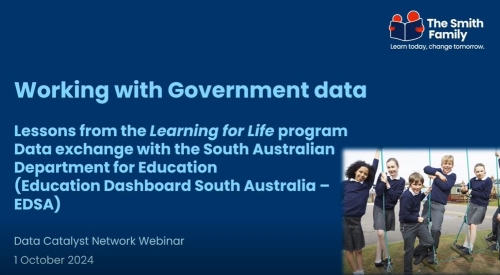
Working with Government data - Lessons from the Learning for Life program 1 October 2024
This DCN webinar introduced The Smith Family to talk about how they use the data to overcome educational inequality by utilising real-time data through their successful partnership with the South Australian Department for Education.
So what they have done is to create a dashboard for schools to track on every student and have some simple analyst graphs to show the trends which allow the school and government to keep track of each school and student’s record in a visible way. Also, the importance of up-to-date data is that we can quickly identify the student who is facing issues no matter with family or in school and give help immediately before the situation gets worse.
Some of the key takeaways are that we have to build trust between the school, parents, and also the platform to make sure the data is handled by suitable people and the data is protected.
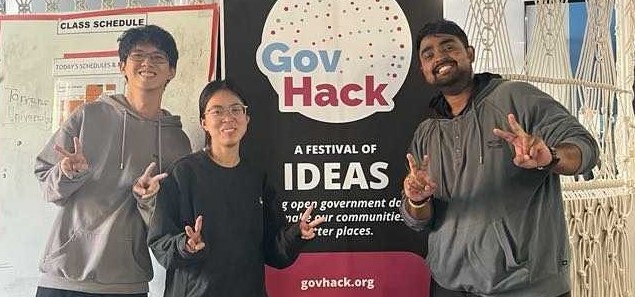
Photo: Volunteer Jason with Intern Tien Trang My Au and Volunteer Anubhav Dattagupta at GovHack 2024
GovHack Event 6-8 September 2024
GovHack is an annual Open Data competition held this year from September 6th to 8th, 2024, across Australia and New Zealand. SAcommunity supports GovHack with open data, and the SAcommunity database is available on Data.SA, the South Australian Government Data Directory.
Jason participated as a competitor in the hackathon and volunteered for the event, specifically assisting with the reception and catering aspects of the annual competition, which allowed the event to run smoothly. During the competition, Jason worked on the topic: Smart Mobility: Optimising Urban Infrastructure for a Sustainable Future, proposing sustainable urban mobility solutions using the open data available, with an accompanying video to explain his concept.

Digital Training & Development
Volunteers and interns have access to the Connecting Up Digital Learning Platform providing live webinars and recorded webinars, workshops and webcons presented by subject-matter experts to understand more about a range of technology topics for the not-for-profit sector.
Relevant training sessions were selected, attended, summarised and assessed by Jason to look at how these sessions can enhance his internship experience have included:
Data basics to Mastery: Getting started
Boost your not-for-profit funding with the Google ad grant
Cyber Security for NFP Staff
Cyber security risks and incident response
Data loss prevention with Microsoft: Protecting sensitive data
Digital Technology in the Not for Profit Sector - 2024 Reoirt Launch
Cyber Security self-assessment &work plan development
Boosting personal productivity with AI solutions that actually work
Scoping an AI project? Do it with data
Introduction to Microsoft Copilot: Unleashing AI in your workflow
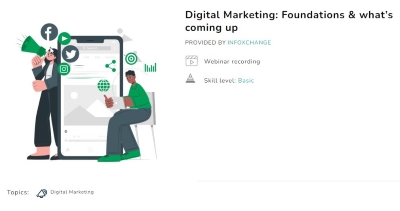
Digital Marketing: Foundations & What’s coming up
The webinar began by encouraging attendees to share how their thoughts on their own organisation in applying digital marketing.
Speakers emphasised the critical role of digital marketing for not-for-profit organisations. Outlining a digital marketing capability framework to help these organisations assess their current digital presence and improve their strategies across various categories. These included websites, email marketing, social media, digital fundraising, and event management.
The framework categorised organisations as "Challenged," "Basic," "Intermediate," or "Advanced," highlighting the steps needed to enhance their digital capabilities. Therefore introducing a roadmap for digital marketing development, illustrating how organisations can progress from having a minimal online presence to engaging actively with their communities through strategic marketing efforts.
The session ended by providing an overview of a number of upcoming webinars on digital marketing to provide training on various topics, based on interest and need, such as social media activation, and AI content creation, all aimed at enhancing the digital skills of participants.
Cyber Security: Foundations & what's coming up
The webinar commenced by emphasising the paramount importance of cybersecurity. It underscored that cyber attacks are not a matter of “if” but rather “when.” This stark reality underscores the inescapable nature of cybersecurity threats, regardless of the size or nature of an organisation.
After that, they introduce a cybersecurity roadmap that outlines the steps we can take to enhance the security of our organisation at different stages.
Finally, the speaker announces upcoming webinars that will cover various topics, including managing security and risk on your website using WordPress, effective endpoint management with Microsoft Intune, cyber security risks and incident response, cyber security self-assessment and work plan development, and data loss prevention with Microsoft: Protecting sensitive data.
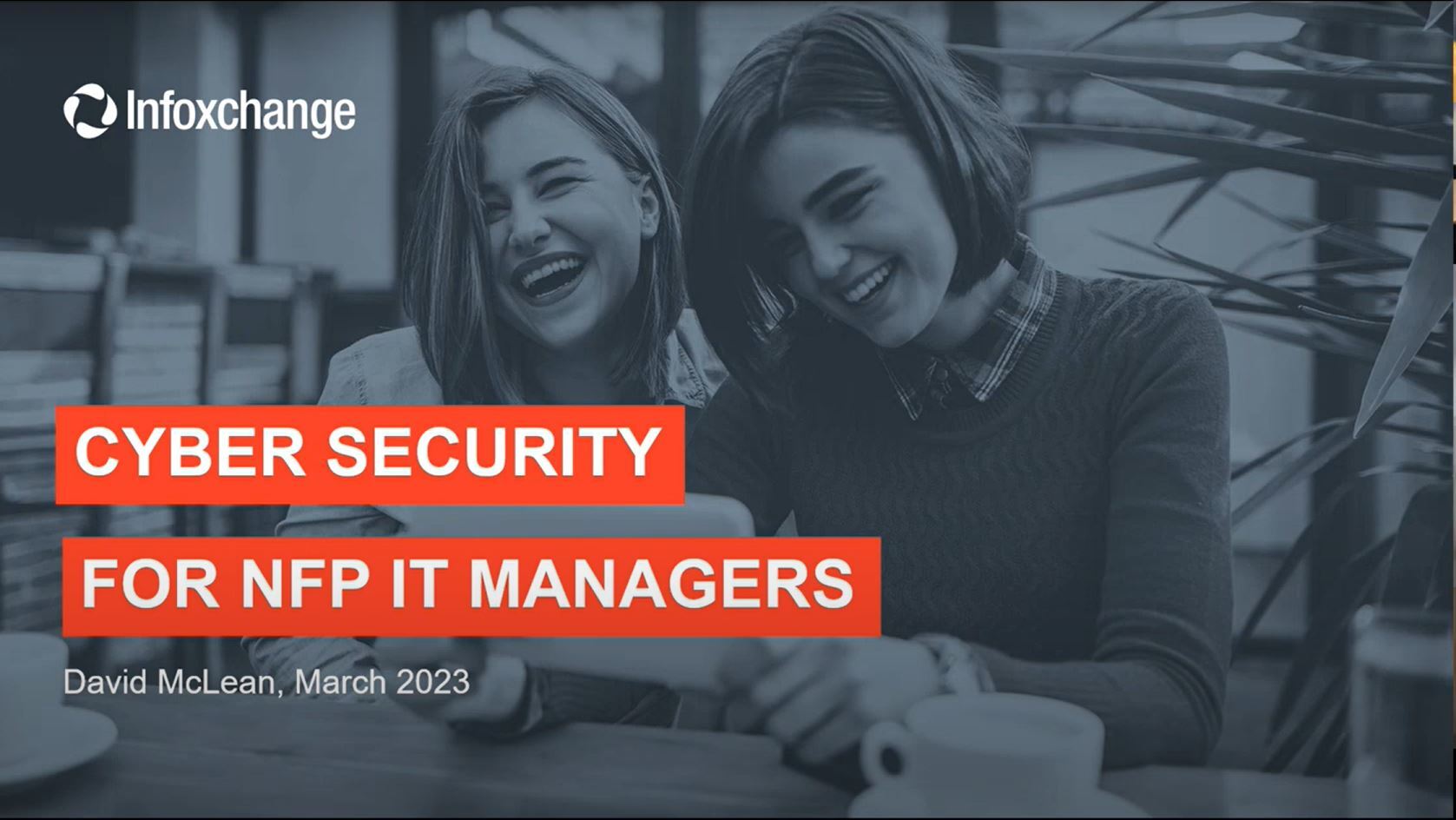
I attended a recorded webinar titled “Cybersecurity for IT Managers” hosted by David McLean. It covered the latest trends and best practices for safeguarding IT systems.
The webinar began by discussing the alarming rise in data breaches. Then, it addressed the challenges faced by Non-Profit Organisations (NFPs), which often handle sensitive data but lack technical expertise to protect it. Security is a shared responsibility, and it’s not just one person or a small group who should bear the burden.
The speaker asked if our organisation provides documented guidance for staff on secure information storage. He emphasised the importance of this information, which could pertain to our clients or customers, and underscored its confidentiality.
Implementing a data storage policy simplifies information access, facilitates backups, and safeguards against risks.
User access security was addressed, with advice against using the same password across multiple accounts to prevent credential stuffing attacks. Multi-Factor Authentication (MFA) was suggested to enhance security and minimise password changes.
The concept of Bring Your Own Device (BYOD) was discussed, emphasising the importance of keeping devices up-to-date, refraining from storing personal information about clients, and ensuring physical protection.
Resources available in the Digital Transformation Hub included DIY and End User security policies, as well as free webinars to empower NFPs to enhance their organisation’s security.
The speaker discussed various security incident entry points and presented case studies illustrating phishing attack identification in real-world scenarios.
At the end, David highlighted other staff members’ contributions. For instance, Finance ensures appropriate and regularly reviewed authority delegations, while HR ensures prompt and comprehensive onboarding and off-boarding.
In conclusion, I learnt cybersecurity is everywhere in an organisation and we have to keep aware and updated to the technology to minise the chance of putting our organisation under risk.
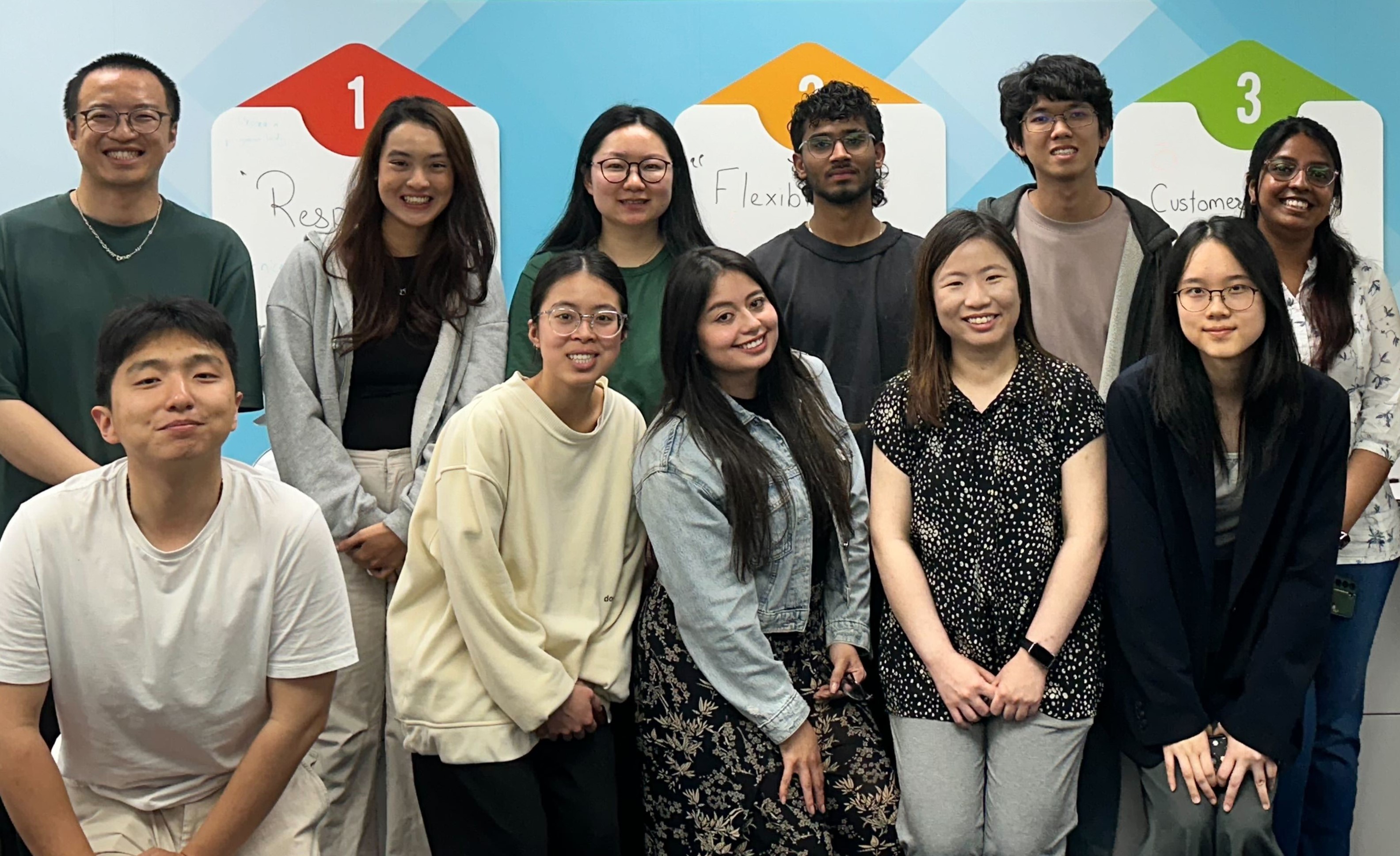
Photo: Yong Kheng Beh Visits Connecting Up with Q&A 16 October 2024
Yong Kheng Beh Visits Connecting Up with Q&A 16 October 2024
We talked to Yong Kheng Beh about her interview as a Software Developer was great to have her visit Connecting Up on October 16, 2024. She talked about her journey and how she used her background to get her interview. She started as an intern at a company towards a full-time role. Yong shared helpful insights from her time as an intern at different companies. Her stories about working on a project with Connecting Up inspired us and showed how important teamwork and learning from one another are. Her visit left us feeling motivated and eager to use what she taught us.
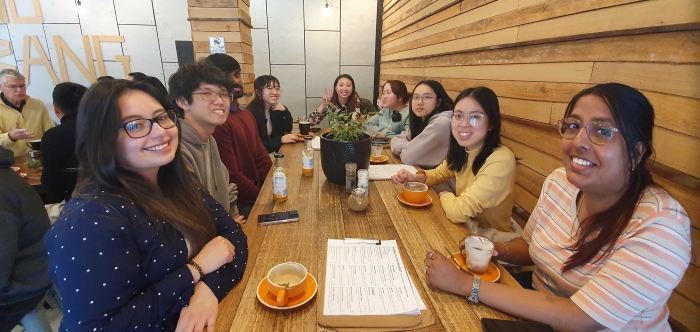
Photo: Coffee Connect 09 October 2024 between Connecting Up Staffs (Julia and Chloe) and SAcommunity Interns/Volunteers (Teffi, Alex, Karthick, Lily, Tien, and Kurinji)
Coffee Connect for Mental Health Awareness Week 7 - 13 October 2024
During Mental Health Awareness Week, Jason have a chat with Chloe and Julia, staff members at Connecting Up office at Café Bang Bang. This informal coffee chat provided a chance to learn about their experiences and backgrounds, as well as what drew them to Connecting Up. The meaningful conversation reinforced Jason’s appreciation for the supportive and inclusive environment at Infoxchange.
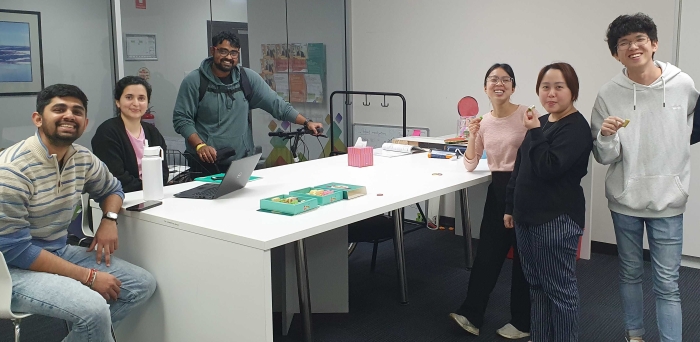
Photo: Harsh's Birthday Celebration on at SAcommunity with Anju, Anubhav, Tien, Alex, and Karthick
Photo: Quick Linx chatting between Jason and Praveem Sreekumar on 22 October 2024
Quick Linx with Praveen Sreekumar - 22 October 2024
Jason had an engaging Quick Linx session with Praveen Sreekumar, an ITS Solution Architect based in Melbourne. The program aims to foster casual conversations among staff members, and Praveen’s discussion with Jason was both insightful and beneficial for his career development.
We began the conversation by sharing our thoughts on our cities, Adelaide and Melbourne. Then, we delved into our backgrounds and why we are drawn to working for NFP organisations. We covered a wide range of topics, including my current situation and the steps Jason can take to enhance his capacity, such as acquiring specific technical skills and certifications.
Praveen shared his career journey from an IT Technician to a Solution Architect, highlighting the shift from customer-facing to problem-solving. His guidance provided me with actionable steps for Jason's career growth and a clearer understanding of how to transition from volunteering to the workforce.
Overall, the conversation was engaging and offered both professional and personal insights that will be valuable in the next stages of Jason's career.
All Staff Town Hall - 30 October 2024
All Town Hall Meeting is a quarterly gathering of all staff members in Infoxchange. During these meetings, the CEO provides updates and insights into the company’s upcoming plans. Each group presented progress on reconciliation efforts, particularly focusing on the next Reconciliation Action Plan. The meeting also addressed the impact of artificial intelligence (AI) on the company and outlined the roadmap for implementing AI tools into our workflow and services. Additionally, we discussed our next year’s investment headlines and funding opportunities, which provide a glimpse into the company’s future projects. Finally, they introduced the Let’s Talk program, designed to facilitate discussions on organisational projects and gather feedback. This meeting broadened Jason’s understanding of how a company operates and how different roles, working independently, ultimately contribute to the company’s success.

Photo: Mentor Meeting between Jason and David McLean on 19 November 2024
Mentor Meeting with David McLean - 19 November 2024
Connecting Up Interns get to meet a staff member from the wider Infoxchange organisation for an informational mentor meeting. This program lets them ask the staff member about their job, how they got there, and learn about their career and professional development to get some insights and guidance that can help them succeed.
David McLean, Information Security Lead at Infoxchange
I chose David McLean, the Information Security Lead at Infoxchange, as my mentor for this program because of his extensive experience in cybersecurity. He is the ideal mentor to guide me as I work toward my goal of building a successful career in this dynamic field.
During our discussion, David provided valuable advice on transitioning into cybersecurity as a fresh graduate. He emphasised starting with entry-level roles and then gradually moving into cybersecurity positions within the same organisation. Sharing his own career journey, he illustrated how a combination of strategic choices and continuous learning can lead to success. He also stressed that cybersecurity requires a commitment to lifelong learning, given the ever-evolving nature of the field.
David highlighted the importance of side projects to enhance both technical and soft skills. For example, he suggested that aspiring consultants focus on improving communication and public speaking skills, which are critical for building credibility and influencing stakeholders, even if these skills don’t appear prominently on a resume. He also encouraged taking on "stepping-stone" roles—jobs that may not align perfectly with one’s ultimate goals but offer valuable experience and bring you closer to achieving them.
One key takeaway was David’s advice to focus on understanding and addressing a company’s needs. He encouraged me to step up and take responsibility, even for tasks outside my comfort zone, and to approach challenges with an open mind. He emphasised the importance of embracing change, valuing diverse perspectives, and striving to make a meaningful impact. David also inspired me to seek out organisations that align with my values and work toward creating positive change.
This meeting with David McLean was incredibly insightful and gave me actionable steps to grow both professionally and personally. I plan to implement his advice by seeking roles where I can make a difference, engaging in side projects to enhance my skills, and committing to continuous learning in my journey toward a cybersecurity career.
SAcommunity Team 25 October 2024
Reflection
As a volunteer with SAcommunity's Data Analytics Team since August 2024, I have focused on improving data quality and reporting processes to support community services. My primary responsibilities include data cleaning, analysis, and reporting using tools such as Python, Power BI, and Google Analytics. One key achievement was automating the data cleaning process in a team with Anubhav and Mihir for Google Analytics reports, which significantly improved efficiency and accuracy.
I have also contributed to creating detailed council service reports for Adelaide City Council and Orroroo Carrieton Council. These reports provide actionable insights, helping councils understand and enhance their service offerings. Additionally, I participated in the GovHack competition, proposing innovative solutions for sustainable urban mobility and showcasing my ability to apply data-driven approaches to solve real-world challenges.
Beyond technical work, I actively engage in professional development opportunities provided by SAcommunity. I have attended webinars, such as the Digital Marketing Summit, and participated in events like the Data Catalyst Network, where I learned about using cross-sector data to address societal challenges. These experiences have deepened my understanding of the broader impact of data analytics on community development.
Through mentor informational meeting and participating in stakeholder meetups, I have gained valuable insights into effective communication and project management within the not-for-profit sector. My time at SAcommunity has not only enhanced my technical skills but also strengthened my ability to collaborate and deliver meaningful outcomes for the community.
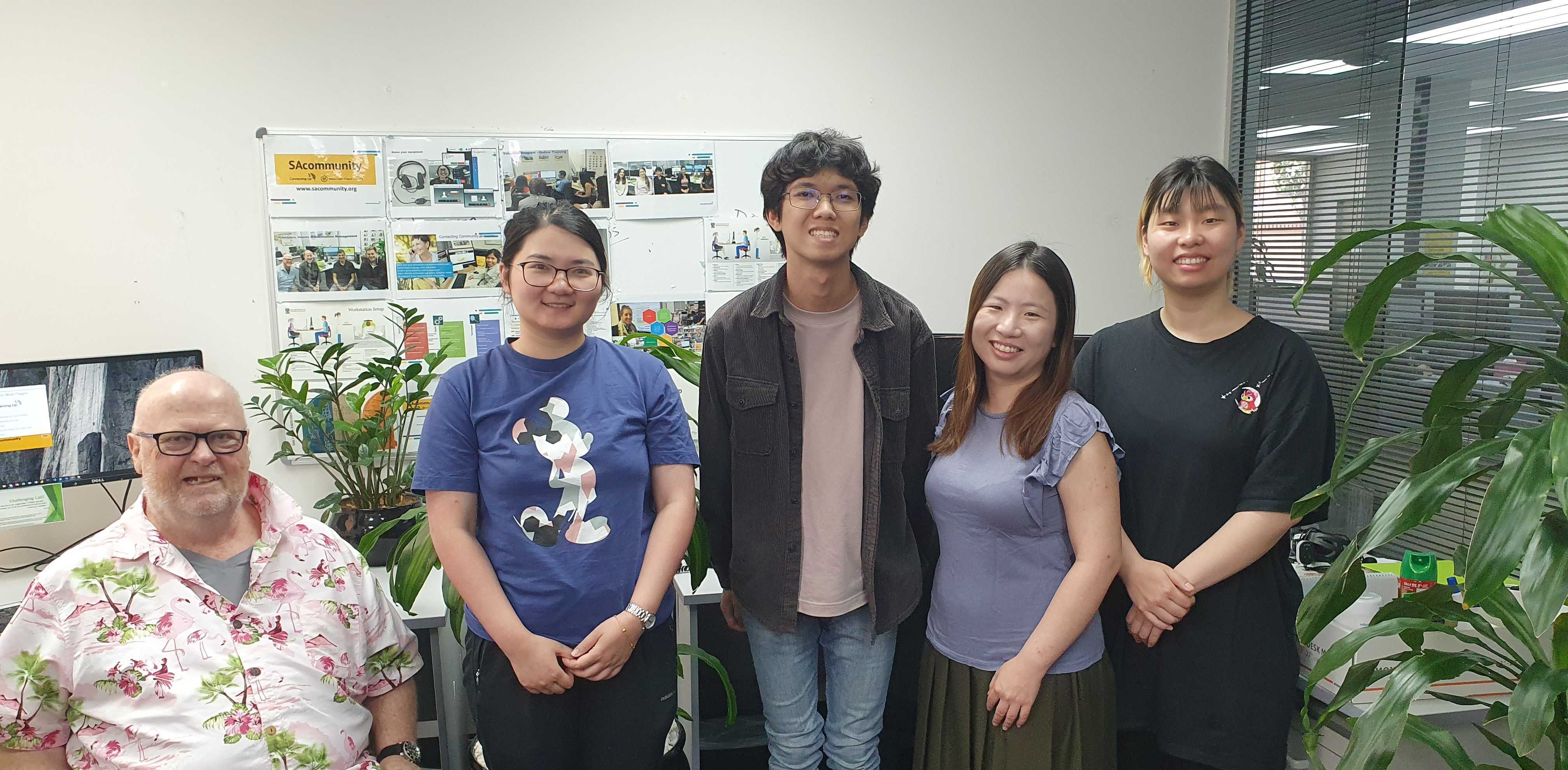
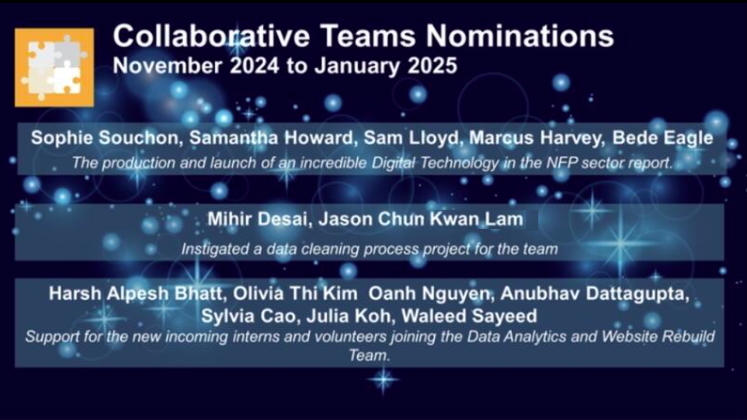
Sign up for the newsletter!
Subscribe to our monthly newsletter to receive news, information and events for the community sector in SA.




